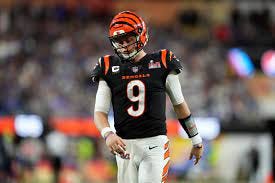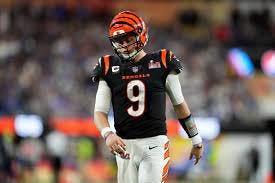This is what I said to my husband in the middle of last night’s Super Bowl extravaganza. I laughed as I said it. I laughed as soon as the thought popped into my head, being a sort of ridiculous thought to have, even if it is the absolute truth.
In January 2022 as the Bengals were preparing for the first Super Bowl appearance since 1989, I was, to say the least, hyped. My grandfather had bought season tickets way back in 1968 when Paul Brown and the Bengals first started their franchise in Cincinnati. For a good chunk of my late twenties, I spent a lot of Sunday’s with my dad at Paul Brown Stadium. We were often too hot or too cold or too wet. For some of those early games, it felt like Dad and I were the only people in the stadium. More often than not, the game for us ended when Dad became too disgusted with the team and we went home.
But then came the good years—the Andy Dalton, Chad OchoCinco, T.J. Houshmandzadeh, Marvin Lewis years. The times we beat the Steelers. The playoff games, which were exciting, even if we never won any of them.
Which is all to say, I’m a pretty big Bengals fan and have been for my entire life. That we were going to the Super Bowl one year after a losing season was a pretty big deal.
I was in a place in my writing life where I’d decided to start pitching articles like mad. In 2020, I’d come so, so fucking close to getting a piece in The New York Times about transgender people’s right to play sports as their actual gender, but then COVID hit and no one was interested in transgender people (that essay was eventually published at Newsweek, here). I decided to pitch a piece about the Bengals scrappy, comeback season. I was sort of in love with Joe Burrow, mostly after seeing what the inside of his house looked like during the 2020 COVID NFL draft. Dude’s living room was about the most Ohio/Midwestern/Rust Belt thing I’d ever seen.
So I wrote a pitch. It went like this:
If you live in a small town in Ohio or Kentucky or Indiana, you only make the national news when something disastrous happens. A tornado. Flooding. A drug epidemic. New Yorkers may not be able to find your state on a map, but they’re certain whatever’s happening there is bad.
For years and years, the Bengals were a lot like those small towns. No one paid them much attention except to note how horrendous they were. The Bengals’ first Super Bowl appearance since 1988 is certainly a big deal to the 300,000 people who live in the Cincinnati metropolitan area. But their fandom extends well past the Ohio River into the rolling hills of Kentucky to the south and the cornfields of Indiana to the west.
For all those fans, the Bengals’ amazing turn-around season has a unique appeal. The small-market team led by a small-town guy in quarterback Joe Burrow, takes the rest of the world by surprise. For a moment, it’s possible that the focus might be more than our disasters, but the kind of steadfast, everyday loyalty and persistence that survives even in the face of repeated failure.
In this ~1000-word essay, I draw a parallel between the Bengals’ success and the tiny, unseen victories of rural, small town life.
I have to confess, I still love the hell out of this pitch. It is a great pitch. It gets me fired up even now.
I sent it to The New York Times and didn’t hear anything. Then I saw a Tweet on Sonia Weiser’s Opportunities of the Week. The Washington Post was looking for opinion pieces on ALL kinds of topics. Why not give it a try?
Like some amazing story of sports magic, an editor at The Washington Post e-mailed me back and was interested. I wrote the full essay and sent it off. He liked it. It was poised and ready to go. It would be published in the WaPo, but only if the Bengals won. My whole future would be decided by the Bengals performance. Can’t you just hear the swelling sports triumph soundtrack in the background? I certainly could.
Literally, during the game, which I actually invited people to my house to watch (I never watch sports I care deeply about with other people because they are annoying and also I am an emotional mess as a sports fan), people from the WaPo were e-mailing me with proofs and paperwork to fill out. The Bengals were winning and I, friends, was going to be famous! I was part of that team of destiny!
Well, if you’re not a sports fan, let me just tell you, that is not how it went. The Bengals were ahead with about six minutes left in the game when the Rams’ drove down the field for what would be their game-winning touchdown. We had 1:25 left on the clock to score, but Aaron Donald put an end to that by sacking Joe Burrow. All I remember is the sinking feeling of disbelief in those last few minutes. We weren’t going to win. We really weren’t going to win.
Friends, no one cares about the scrappy, comeback team that loses the Super Bowl, so no op-ed in The Washington Post for me. Which is why I am decidedly not famous today. No six figure book deal which allowed me to retire immediately. No appearances on late-night TV or even public radio, for god’s sake. Nope, not even a blip in the fabric of my very un-famous life.
Okay, yes, I’m probably a little less miserable than I would be had I become famous because, as Jason Isbell said once in his infinite wisdom, no one really wants to be so famous they can’t just go to the Target.
Still, do I wish the Bengals would have won? Hell, yes.
Have I ever contemplated switching my allegiances to a different, more, you know, winning team? Hell, no. I mean, first, what kind of nightmare person does that? Second, that’s sort of what the whole essay was about—being part of that town or team or state or region that really never wins. I’m a Reds fan, too, and we haven’t won the World Series since 1990. Yankee’s fans and Mets’ fans and Red Sox fans and Cubs’ fans (bleh) get to talk endlessly about their fandom in Ken Burns’ documentaries. They have famous fans like Billy Crystal and Doris Kearns Goodwin and Stephen King. The Reds? Not so much. Being a fan of okay Cincinnati sports teams is probably never going to make me famous. It will probably bring me much heartbreak, because this is the nature of sports fandom and especially so if you are from a small market town. That’s sort of the point.
Still, not gonna lie, it was a great essay, even for a Bengal’s fan. Here it is, in all it’s bittersweet, unfamous glory:
At last, Cincinnati. The Super Bowl trophy is yours. But it is also ours – countless Bengals fans in small towns in Ohio, Kentucky and over here in Indiana, where I live. We feel a special kinship for a team in a city that is 65th in population and a media market that Nielsen ranks 36th in the country, with a franchise valuation that Forbes pegs at 31st in a 32-team league.
Up until this NFL postseason, trying to find substantive national sports coverage of the Cincinnati Bengals felt like searching for one of those rare white Bengal tigers in the wild.
Instead, I got used to articles about the eccentricities of Chad Johnson, who in the 2000s changed his last name to Ochocinco (he wore jersey No. 85) and later changed it back. Another old reliable was the cheapness of the Bengals’ owner (yes, it’s true, we still don’t have an indoor practice facility). Mostly it was just year after year of reports on the Bengals’ bum luck.
It didn’t seem to matter that the team made the playoffs five out of six years between 2009 and 2015 with head coach Marvin Lewis. For the Bengals, since their NFL debut in 1968, there has tended to be little good news or no news at all. But that’s how it goes when the city the team plays in might as well be a small town, for all the attention it gets from the big media on the coasts.
The Bengals aren’t unique in drawing from a wide geographic area, but their support is particularly rural, small-town and Midwestern, fused with a little bit of Southern. Bengals fans, like the team itself, are used to being ignored. If you live in a small town in Ohio, Kentucky or Indiana, you only make the national news when something disastrous happens. A tornado. A flood. A drug epidemic.
Or you’re assumed, even in these enlightened and inclusive times, to be laughable, backward because you’re rural. New Yorkers may not be able to find your state on a map, but, then again, they wouldn’t bother.
That’s why the Bengals’ amazing turnaround season (they went 4-11-1 in 2020) meant so much to the fans in this part of the world. Before this year, the team’s last playoff victory was in 1990. They were led by the miracle-working young quarterback Joe Burrow, who grew up in Bengals country (see: “Tiny Ohio town bursting with pride over local hero Burrow”). With Cincinnati’s victory at SoFi Stadium, the decades of their fans’ steadfast, workaday loyalty finally were rewarded.
The rest of the world may have been surprised at the Bengals’ scrappiness – at their refusal to give up, staging one dramatic, unbelievable comeback after another to reach the Super Bowl.
One of the keys to that success is what NFL coaches call “culture.” Locker room culture is an ephemeral thing, important to winning but hard to describe. You know it when you see it and the Bengals had it this season. For this team, it’s a deep sense of togetherness. “These guys believe in each other and they play for each other, and it’s special,” said offensive coordinator Brian Callahan ahead of their overtime victory against the Kansas City Chiefs in the AFC Championship game.
That resonated with plenty of Bengals fans. If you grew up on the streets of one of those small towns or out in the country stuck between cornfields or tucked into hills along a sandy river bottom, you know about scrappiness and togetherness, especially when luck might have long run against you. Disasters hit. People get sick. Houses burn down. Neighbors struggle to make ends meet.
But if you’re lucky, you’ve got a culture – a sense that you’re in it together. You believe in each other, you help each other, and that’s enough to get you through.
For the Bengals, it got them all the way through.
Robyn Ryle is a sociology professor at Hanover College in Hanover, Ind., and the author of “She/He/They/Me” and “Throw Like a Girl, Cheer Like a Boy





Alas, I know all too well!
Awesome, baby! I was an early Bengals fan, living in Cincinnati in 1968/69. Somehow, my deranged or disarranged brain remembers being in the audience in Louisville for the spectacular Tony Bennett when I think the Bengals were playing the 49ers. He was obviously uncomfortable because he wanted to be watching the game because he left his heart in San Francisco. I don’t care. I still love Tony Bennett more than life. ❤️